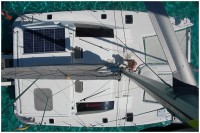
Oceans Dream
02 August 2014 | ENGLAND
15 March 2014 | Malaysia
29 January 2014 | Thailand
26 December 2013 | Phuket, Thailand
30 November 2013 | Langkawi, Malaysia
03 November 2013 | Puteri Harbour Marina, Johor Bahru, Malaysia
04 October 2013 | Indonesian Borneo
22 September 2013 | Lovina, Bali
05 September 2013 | Komodo Island, Indonesia
18 August 2013 | Flores Island, East Nusa Tengarra, Indonesia
06 August 2013 | Kupang, Timor island
26 July 2013 | Northern Territory, Australia
21 July 2013 | Uluru, Australia
29 June 2013 | Fannie Bay, Darwin
17 June 2013 | Shelburne Bay, Cape Grenville, Australia
08 June 2013 | Carins, QLD
29 May 2013 | Townsville
12 May 2013 | Queensland
26 April 2013 | Mooloolaba, QLD
24 March 2013 | Mooloolaba, Queensland
Orang-utans in the Wild
04 October 2013 | Indonesian Borneo
Anchored safely off the town of Kumai some 20 miles up the river on the Indonesian side of Borneo, the crew of Oceans Dream were beside themselves as the moment approached to meet orang-utans in the wild.
To access the orang-utans, we booked Isy Iskandar (www.borneotour.org) who, along with his two-tiered 'klotok' boat served as our guide, restaurant, watchtower, and home for a couple of days. Isy started guiding 16 years ago and so was a fountain of knowledge about the Tanjung National Park and its inhabitants.
Having arranged for his father to 'boat-sit' in our absence, Isy and his crew of three picked us up from Oceans Dream to head off on what was to be an unforgettable adventure on the Sekonyer River.
Puttering up the river towards Camp Leakey we quickly relaxed into the sedate pace of life on board as the crew plied us with the very best of Indonesian cuisine. Isy told us of the devastation created by the palm oil plantations endangering the orang-utans in the Kalimantan region, one of the world's greatest wildernesses covering two thirds of Borneo and 30% of Indonesia. Researchers fear that the few orang-utans that do remain will not survive the continued loss of habitat due to illegal logging.
Four hours into our trip and we pulled up alongside the dock at Camp Leakey. Eager to spot our first orang-utan we leapt ashore to be welcomed by some youngsters and an adult.
In reality, these great-apes are 'semi-wild' with Rangers appearing at jungle platforms once a day, laden with panniers full of bananas. They are mostly vegetarian eating fruit, shoots, leaves, nuts and tree bark but with the shrinking forest, their way of life is becoming increasingly more difficult and the daily feeding helps as part of a relocation process.
Isy took us off of the well-trodden paths on route to the feeding platforms where we came across the orangs in what would seem a more 'natural environment'. He had previously informed us that the orang-utans are not afraid of humans, and being seven times stronger under no circumstances should we approach them. If however, the orang-utans were to make a move towards us, to pull on a hand or a zip pocket for instance, just to go with it as an attempt to retaliate could end in a nasty bite. With this in mind, when Jackie was offered an outstretched hand by an orang-utan mosying by, the photo opportunity captured the fear rather than excitement often felt when in such close proximity to these great-apes ...
Despite how it might look, the foot was offered, it wasn't grabbed by Jackie for the picture!
Many of the youngsters were intrigued by their reflections in the camera lens and away from the feeding platforms there were no barriers between human and the orang-utan but not surprisingly, the Rangers don't promote the off-road stuff ... the guides would be in trouble if caught!
Arriving at the jungle platform, the Rangers make whooping noises to the surrounding trees and gradually, large numbers of the orang-utans appear for their daily feast. This included a mother with her baby which will be reared for seven years learning how to swing from branch-to-branch and how to identify medicinal qualities of plants and the poisonousness of nuts.
Privileged to have seen some of these fast dwindling 'people of the forest', we took off on our 'klotok' as Isy searched for a mooring spot beside the jungle, among the pandanus leaves for the night...
The upper deck was transformed into our bedroom with crisp white linen and mosquito net.
We were served another sumptuous Indonesian meal by candlelight, Isy entertained us playing Beatles songs on his guitar. We turned in early to be awoken by a myriad of animal calls early the next morning.
Meandouring slowly to Camp Two, we stopped off at a village where the local people had been relocated due to the deforestation and setting up of the National Reserve, their thoughts on the logging situation were made clear ...
At Camp Two we experienced another display of gymnastics as the orang-utans of all ages swung effortlessly through the jungle never seemingly to misjudge the distance between, or strength of the branches. For another hour we were again mesmerised by these majestic animals and could so easily the very close genetic connection (said to be 97%) with human beings.
As we walked back through the jungle to our klotok, we marvelled at the experience of the last two days and needed the peace and tranquillity of the journey back to reflect on our magical couple of days in the jungle.
Comments
| Vessel Name: | Oceans Dream |
| Vessel Make/Model: | Admiral 40 catamaran |
| Hailing Port: | Plymouth, UK |
| Crew: | Adrian & Jackie |
| About: |
Gallery not available
About Us

Who: Adrian & Jackie
Port: Plymouth, UK